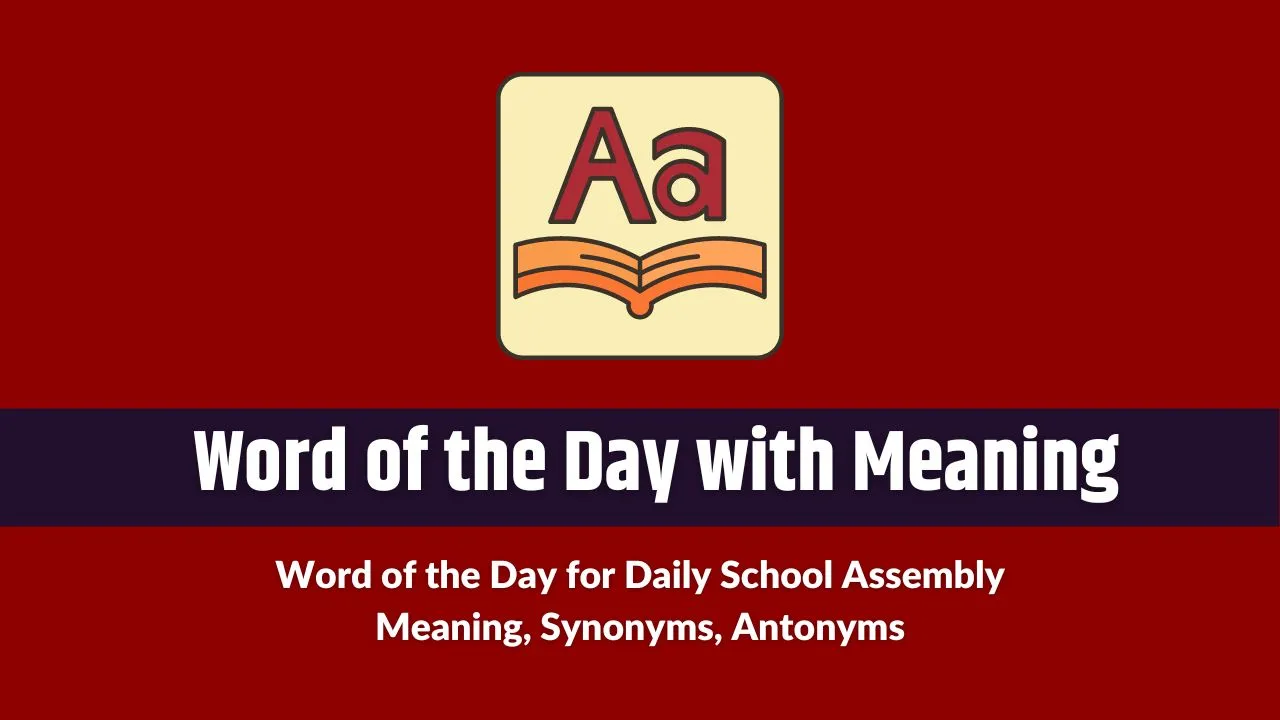Word of The Day for School Morning Assembly With Meaning
Discover the Power of the “Word of the Day” in School Assemblies
In this article, we explore the exciting “Word of the Day” initiative in school assemblies. This simple idea can have a big impact on students’ language skills.
Learn how a daily word can spark curiosity, boost vocabulary, and create an engaging learning environment.
Join us as we dive into how one word each day can inspire young minds, encourage continuous learning, and make school assemblies more vibrant and stimulating.
Let’s uncover the magic behind the “Word of the Day”!
Here’s the “Word of the Day” list for August, continuing with detailed entries for each word including Meaning, Synonyms, Antonyms, Etymology, and an Example:
| Word of the Day | Details (Meaning, Synonyms, Antonyms, Etymology, Example) |
|---|---|
| 1. Facetious | Meaning: Treating serious issues with deliberately inappropriate humor | Synonyms: Flippant, glib | Antonyms: Respectful, serious | Etymology: From French facetie, meaning ‘jest’ | Example: He was being facetious when he called the solemn meeting a party. |
| 2. Garrulous | Meaning: Excessively talkative, especially on trivial matters | Synonyms: Loquacious, verbose | Antonyms: Reticent, taciturn | Etymology: From Latin garrulus (talkative) | Example: The garrulous parrot disrupted the quiet study room. |
| 3. Hapless | Meaning: Unfortunate | Synonyms: Unlucky, ill-fated | Antonyms: Lucky, fortunate | Etymology: From Old Norse hap (luck) with a negative prefix | Example: The hapless sailor was lost at sea. |
| 4. Immutable | Meaning: Unchanging over time or unable to be changed | Synonyms: Permanent, fixed | Antonyms: Mutable, changeable | Etymology: From Latin immutabilis | Example: The laws of physics are considered immutable. |
| 5. Juxtapose | Meaning: To place or deal with close together for contrasting effect | Synonyms: Compare, collate | Antonyms: Disconnect, separate | Etymology: From Latin juxta (next) + French poser (to place) | Example: The exhibition juxtaposes modern art with classical pieces. |
| 6. Kinetic | Meaning: Relating to or resulting from motion | Synonyms: Dynamic, moving | Antonyms: Static, stationary | Etymology: From Greek kinetikos (moving) | Example: The dancer’s kinetic performance captivated the audience. |
| 7. Lethargic | Meaning: Affected by lethargy; sluggish and apathetic | Synonyms: Lazy, sluggish | Antonyms: Energetic, active | Etymology: From Greek lethargos | Example: I felt unusually lethargic on the hot summer day. |
| 8. Meticulous | Meaning: Showing great attention to detail; very careful and precise | Synonyms: Thorough, painstaking | Antonyms: Careless, negligent | Etymology: From Latin meticulosus (fearful) | Example: The meticulous artist spent hours on the fine details of the painting. |
| 9. Nefarious | Meaning: (Typically of an action or activity) wicked or criminal | Synonyms: Evil, sinful | Antonyms: Virtuous, honorable | Etymology: From Latin nefarius (wicked) | Example: The villain’s plan was discovered to be as nefarious as it was clever. |
| 10. Obfuscate | Meaning: Render obscure, unclear, or unintelligible | Synonyms: Obscure, confuse | Antonyms: Clarify, elucidate | Etymology: From Latin obfuscare (to darken) | Example: The technical jargon in the manual obfuscates its instructions. |
| 11. Pernicious | Meaning: Having a harmful effect, especially in a gradual or subtle way | Synonyms: Harmful, destructive | Antonyms: Beneficial, harmless | Etymology: From Latin perniciosus (destructive) | Example: The pernicious weed spread throughout the farmland. |
| 12. Querulous | Meaning: Complaining in a petulant or whining manner | Synonyms: Petulant, crabby | Antonyms: Contented, agreeable | Etymology: From Latin querulus (full of complaints) | Example: The querulous tone of his voice was annoying. |
| 13. Reticent | Meaning: Not revealing one’s thoughts or feelings readily | Synonyms: Reserved, withdrawn | Antonyms: Communicative, open | Etymology: From Latin reticere (be silent) | Example: She was reticent about her plans for the future. |
| 14. Sagacious | Meaning: Having or showing keen mental discernment and good judgment | Synonyms: Wise, clever | Antonyms: Foolish, unwise | Etymology: From Latin sagax (wise) | Example: The sagacious investor foresaw the market crash. |
| 15. Tenacious | Meaning: Tending to keep a firm hold of something; clinging or adhering closely | Synonyms: Persistent, determined | Antonyms: Weak, surrendering | Etymology: From Latin tenax (holding fast) | Example: His tenacious memory was a valuable asset. |
| 16. Ubiquitous | Meaning: Present, appearing, or found everywhere | Synonyms: Omnipresent, pervasive | Antonyms: Rare, scarce | Etymology: From Latin ubique (everywhere) | Example: Smartphones are ubiquitous in modern society. |
| 17. Verbose | Meaning: Using or expressed in more words than are needed | Synonyms: Wordy, loquacious | Antonyms: Concise, succinct | Etymology: From Latin verbosus | Example: The verbose lecturer often strayed off-topic. |
| 18. Wary | Meaning: Feeling or showing caution about possible dangers or problems | Synonyms: Cautious, careful | Antonyms: Careless, incautious | Etymology: From Old English wær (aware, cautious) | Example: She was wary of strangers who asked too many personal questions. |
| 19. Xenial | Meaning: Hospitable, especially to visiting strangers or foreigners | Synonyms: Hospitable, genial | Antonyms: Inhospitable, unfriendly | Etymology: From Greek xenos (guest, stranger) | Example: The xenial host made sure all her guests felt welcome. |
| 20. Yielding | Meaning: Giving way under pressure; not hard or rigid | Synonyms: Compliant, flexible | Antonyms: Resistant, rigid | Etymology: From Old English gieldan (to pay, yield) | Example: The yielding branches bent but did not break under the snow. |
| 21. Zealous | Meaning: Having or showing zeal | Synonyms: Passionate, fervent | Antonyms: Apathetic, indifferent | Etymology: From Greek zelos (zeal) | Example: The zealous advocate worked tirelessly on behalf of the cause. |
| 22. Aberrant | Meaning: Departing from an accepted standard | Synonyms: Deviant, abnormal | Antonyms: Normal, typical | Etymology: From Latin aberrare (to wander away) | Example: The scientist studied aberrant behavior in the species. |
| 23. Bucolic | Meaning: Relating to the pleasant aspects of the countryside and country life | Synonyms: Rustic, pastoral | Antonyms: Urban, metropolitan | Etymology: From Greek boukolikos (cowherd) | Example: They enjoyed a bucolic existence in the rural setting. |
| 24. Conundrum | Meaning: A confusing and difficult problem or question | Synonyms: Riddle, puzzle | Antonyms: Answer, solution | Etymology: Origin unknown, possibly a whimsical pseudo-Latin alteration of English dialect conny (rabbit) | Example: The mystery posed a conundrum to all who tried to solve it. |
| 25. Dilatory | Meaning: Slow to act | Synonyms: Tardy, slow | Antonyms: Prompt, speedy | Etymology: From Latin dilatorius (delaying) | Example: His dilatory response caused us to miss the deadline. |
Your Daily Source for Anchoring Scripts, Speech Topics, and Inspirational Thoughts to Elevate Your Morning Assembly Experience. Stay with us.






